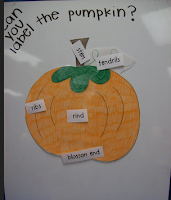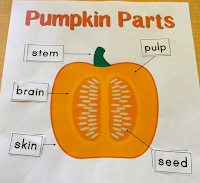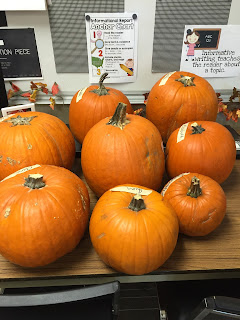Pumpkin Observation and Carving Day! The students were so excited to finally observe their pumpkin's attributes, carve the pumpkin, and eat pumpkin pie. Click on the image to view a slideshow which depicts the different stations and the fun day!
Thursday, 29 October 2015
Tuesday, 27 October 2015
Rice Krispie Pumpkins
Mystery Fruit
Mrs. Funk had a mystery for the grade three students to solve. What is this unusual fruit?
We investigated our science books and looked at our charts.
We looked closely at the fruit - it was dark green and had a distinctive shape. The students noticed it looked like an acorn.
We researched acorn squash and found it looks like a winter squash and is a dark green. From the pictures, we knew this large squash was an acorn squash.
Great detective work!
We looked closely at the fruit - it was dark green and had a distinctive shape. The students noticed it looked like an acorn.
We researched acorn squash and found it looks like a winter squash and is a dark green. From the pictures, we knew this large squash was an acorn squash.
Great detective work!
Monday, 26 October 2015
Cheesy Pumpkins
Sunday, 25 October 2015
Pumpkin Investigations
 We started learning about pumpkins! The class resembles a pumpkin patch as each student brought a pumpkin for carving!
We started learning about pumpkins! The class resembles a pumpkin patch as each student brought a pumpkin for carving!We started with a Venn Diagram charting the differences between apples and pumpkins.
The students were surprised to discover pumpkins are fruits! They belong to the Cucurbitaceae (koo-ker-bih-TAY-see-eye) family and include not only pumpkins, but also squash, zucchini, and gourds.
The students became scientists as they made detailed observations of the outside and inside of our class pumpkin! It is important to have a real pumpkin for students to touch and use as a model for their science notebook diagrams.


The life cycle of the pumpkin was illustrated using an interactive notebook supplied by Babbling Abby.
We explored picture books about pumpkins to discuss the elements of fiction: setting, characters, plot, problem and solution. We partner read to increase our reading fluency and to practice our comprehension skill of summarizing.
The student are investigating nonfiction books and analyzing the difference between the text types. Informational books provide the reader with facts. The students read many information books and cited several interesting facts. Thank you to Clever Classroom for the helpful charts!
We are exploring text features of information books, including pictures, labels, captions, section headings, glossaries, and table of contents. As students start to craft their own informational text, we made a list of how section headings support understanding:
We are exploring text features of information books, including pictures, labels, captions, section headings, glossaries, and table of contents. As students start to craft their own informational text, we made a list of how section headings support understanding:
- Tell the reader what to expect in the upcoming section
- Hint at the main idea of the upcoming section
- Help the reader organize the article's ideas
- Provide a preview of what the article is leading up to
- Provide a transition between the last section and the next one, which has a new main idea
To add some fun, we used leaf rubbing plates to create a fall background. Then, we dipped pumpkin sponges in tempera paint to create a spooky picture.
The following are pumpkin themed books we enjoyed:
Don't tell the students, but tomorrow we will be creating yummy pumpkin creations!
Thursday, 15 October 2015
Tuesday, 13 October 2015
Autumnal Changes
I hope everyone is enjoying the delights of autumn - gorgeous fall weather, pumpkin spice lattes, juicy
apples and the carving of pumpkins. We are enjoying a look at how the world changes along with the season - shorter days,
crisper air, and bare trees.
As part of our Growth and Changes unit, we observed and sampled different types of apples: Granny Smith, Red Delicious, Pink Lady, Royal Gala, Golden Delicious, and Spartan. After tasting each type of apple, students described the
apple (round or tall; red, yellow, or green), the colour of its flesh (white or creamy), the consistency of its peel (thick or thin), the taste (sweet or slightly tart), and its texture (tender or crisp).
The apples were peeled and then we made apple crisp. We cannot wait to devour the tasty treat tomorrow!
Wednesday, 7 October 2015
Subscribe to:
Comments (Atom)


































